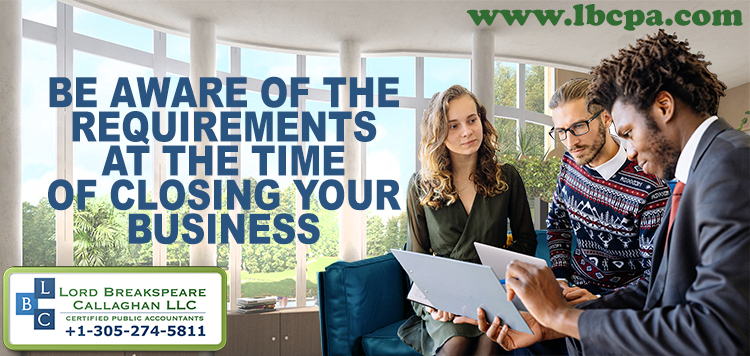LBCPA News 
Click here to go back
The Tax Obligations if Your Business Closes its Doors

Sadly, many businesses have been forced to shut down recently due to economic challenges. If this is your situation, we can help you meet the various tax responsibilities that go with closing a business.
Tax returns
Of course, a business must file a final income tax return and some other related forms for the year it closes its doors. The type of return to be filed depends on the type of business you have. Here’s a rundown of the basic requirements:
Sole proprietorships. Your tax preparer will need to file the usual Schedule C, “Profit or Loss from Business,” with your individual return (Form 1040) for the year you close the business. You may also need to report self-employment tax.
Partnerships. A partnership must file Form 1065, “U.S. Return of Partnership Income,” for the year it closes. The “final return” box must be checked, and the same must be done on Schedule K-1, “Partner’s Share of Income, Deductions, Credits, etc.”
All corporations. Form 966, “Corporate Dissolution or Liquidation,” must be filed if you adopt a resolution or plan to dissolve a corporation or liquidate any of its stock.
C corporations. Form 1120, “U.S. Corporate Income Tax Return,” must be filed for the year you close, with the “final return” box checked.
S corporations. Form 1120-S, “U.S. Income Tax Return for an S Corporation,” must be filed for the year of closing. The “final return” box must be checked on this form as well as on Schedule K-1.
All businesses. Other forms may need to be filed to report sales of business property and asset acquisitions if you sell your business.
Employees and contract workers
If you have employees, you must pay them final wages and compensation owed, make final federal tax deposits and report employment taxes. Failure to withhold or deposit employee income tax, Social Security tax and Medicare tax can result in full personal liability for what’s known as the “Trust Fund Recovery Penalty.”
If you’ve paid any contractors at least $600 during the calendar year in which you close your business, you must report those payments on Form 1099-NEC, “Nonemployee Compensation.”
Other tax issues
If your business has a retirement plan for employees, you’ll want to terminate the plan and distribute benefits to participants. There are detailed notices, funding, timing and filing requirements that must be met by a terminating plan. There are also complex requirements related to Flexible Spending Accounts, Health Savings Accounts and other programs for your employees.
We can assist you with many other complicated tax issues related to closing your business, including debt cancellation, use of net operating losses, freeing up any remaining passive activity losses, depreciation recapture and possible bankruptcy issues.
We can also advise you on the length of time you need to keep business records. In addition, you’ll need to cancel your Employer Identification Number and close your IRS business account.
If your business is unable to pay all the taxes it owes, we can explain the available payment options. Contact us to discuss these issues and get answers to any questions.
If you have any questions regarding Essential Business Accounting, Domestic Taxation, International Taxation, IRS Representation, U.S. Tax Implications of Real Estate Transactions or Financial Statements, please give us a call at +1-305-274-5811.
Source : Thomson Reuters






